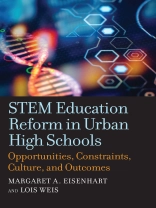STEM Education Reform in Urban High Schools gives a nuanced view of the obstacles marginalized students face in STEM education—and explores how schools can better support STEM learners.
Reporting the results of a nine-year ethnographic study, the book chronicles the outcomes of various STEM education reforms in eight public high schools with nonselective admissions policies and high proportions of low-income and minoritized students: four schools in Denver, Colorado, and four in Buffalo, New York.
Margaret A. Eisenhart and Lois Weis follow the educational experiences of high-ability students from each school, tracking the students’ high school-to-college-to-career trajectories. Through interviews with students, educators, and parents, as well as classroom and campus observations, the authors identify patterns in the educational paths of students who go on to great success in STEM occupations and those who do not. They discuss common mechanisms that undermine the stated goals of STEM programming—opportunity structures that are inequitable, erosion of program quality, and diversion of resources—as well as social and cultural constructs (the figured worlds of STEM) that exclude many minoritized students with potential for success from the STEM pipeline.
On a broader scope, the book explores how and why STEM education reform efforts fail and succeed. With an eye toward greater access to STEM learning, the authors show how lessons of past measures can inform future STEM initiatives.
Sobre el autor
Margaret A. Eisenhart is University Distinguished Professor Emerita of Educational Foundations and Research Methodology at the University of Colorado Boulder. Lois Weis is State University of New York Distinguished Professor of Sociology of Education at the University at Buffalo.












